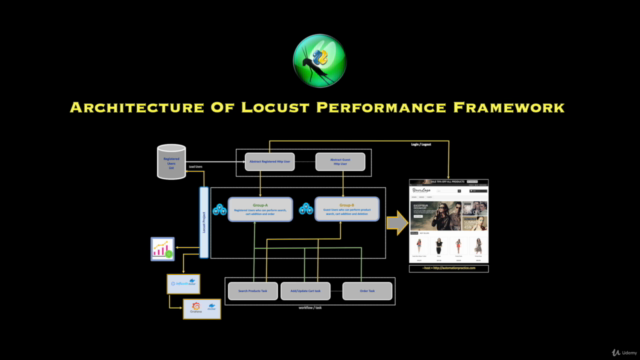Locust & Python - Modern Performance Testing Framework

Why take this course?
🌟 Master the Art of Performance Testing with Locust & Python! 🚀 TDM-201 - Locust Performance Testing Framework - Complete Project Architecture & Advanced Event Reporting
Embark on a comprehensive journey to master performance testing with Locust, one of the most powerful open-source tools for load testing web applications. This course, crafted by industry expert Sandip Ganguli, will guide you through the intricacies of Locust and help you unlock the full potential of this modern performance testing framework.
Course Overview:
🔹 Section 1: Introduction to Locust and Its Standard Features
- Setting Up Your Development Environment: Get started with installing and configuring Locust for your projects.
- Understanding Users, TaskSets, and Sequential TaskSets: Learn how to define and use different types of tasks effectively.
- Event Lifecycle Callbacks: Master the lifecycle of a test with
on_test_start,on_test_stop,on_start, andon_stopevents. - REST Execution: Dive into executing RESTful services using Locust's HTTPUser class.
🔹 Section 2: Building Your Performance Test Framework
- Abstracting the HTTPUser Class: Learn how to create reusable and maintainable user classes.
- TaskSet Modules and User Integration: Understand how to structure your tests for scalability and performance.
- Loading Users from CSV: Discover how to automate user creation with CSV files.
- User Login & Session Management: Ensure your tests accurately reflect real-world usage by managing sessions.
- Multiple User Types & Distribution: Learn to simulate a diverse set of users and their behaviors.
- Registered vs Guest User Cookies: Handle different user types with session management through cookies.
- Custom Logger & Step Loading: Implement custom logging for detailed debugging and stepwise loading of test data.
- Event Hooks & Request Data Store: Utilize hooks to trigger actions based on events and store request data for advanced analysis.
- Data Visualization with InfluxDB & Grafana: Integrate with InfluxDB for storing metrics and visualize the results using Grafana.
🔹 Section 3: Advanced Execution Models
- Master-Slave Architecture Model: Learn how to scale Locust with a master-slave configuration for large-scale testing.
- Locust Execution with Config File: Manage and optimize your tests using configuration files.
🔹 Section 4: Advanced Topics & Reporting
- INIT Event: Understand the role of the INIT event in setting up test scenarios.
- Tagging Tasks: Learn how to categorize tasks for targeted testing.
- Custom Client: Build your own client to integrate Locust into custom applications.
- Stats in CSV: Export performance statistics for further analysis.
- Locust as a Library: Use Locust as a library within other Python projects.
- Unique Users Distribution For Master-Worker Execution Model: Explore strategies for distributing unique users across master and worker nodes.
- Mean & Standard Deviation Calculation: Gain insights into the significance of these statistical measures in performance testing.
By the end of this course, you'll have a robust understanding of how to design, implement, and analyze performance tests using Locust. You'll be equipped with the knowledge to handle complex scenarios and extract meaningful insights from your test results. Join us on this enlightening path to becoming a performance testing expert! 🎓🚀
Course Gallery




Loading charts...